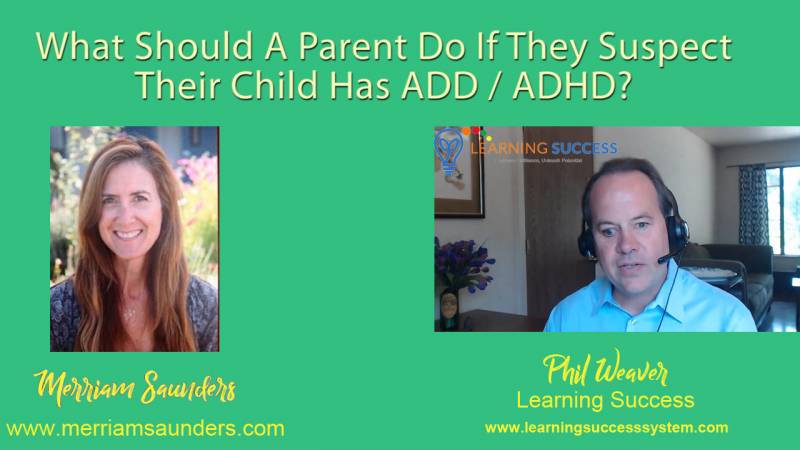
Transcript
Phil: And what should a parent do if they suspect that the child has Adhd?
Merriam: The first thing to do is to visit your pediatrician? Because a lot of different physiological things can mimic ADHD and it's really important tool those things out before just jumping to the conclusion that your child has ADHD and some of those things are things like a sleep disorder. You might not even know that your child has sleep apnea. food allergies, depression, anxiety, experiencing a level of trauma. so they're, you know, there are other things that could be going on and it's important to really understand if you rule everything out, your pediatrician will likely give you a screening tool, which is a questionnaire that a parent and a teacher will fill out. and if you meet, you know, you check off enough boxes, the pediatrician can give that diagnosis. At that point you have a couple of different options.
Merriam: One, if there's a level of impairment happening at school where learning is being impacted, you can ask the school to do an evaluation. And if you have the means you can get a licensed psychologist to do a neuropsychological evaluation, which I highly recommend. If that's something that you can do. It breaks all of the processes down. And so that even if you get the diagnosis of Adhd, this gives you a much better picture of really what's happening behind that diagnosis. Is it an auditory processing problem, a visual processing problem? Is it a working memory issue? it's just a lot more information.
Phil: So any, any of those can be the underlying cause?
Merriam: Well, the underlying cause, you know, we don't really know. We know that it's partially that there's a very high genetic factor, but it can also be a function of environment, not parenting environment. I don't mean that, but I mean, you know, it could be something that happened at birth that, that causes the symptoms. but know what I mean? Is that the Adhd, even though it's not called a spectrum disorder, because there are 18 different symptoms and you can have any combination of them, it's going to present differently for everyone. And one child might have really, really awful working memory. Another child might have terrible auditory processing and those might be the underlying, what's, what's feeding the behavior or feeding the symptoms that are most obvious?
Phil: I see. So it sounds like with it, with those symptoms and then this could be really highly comorbid with like dyslexia or dyscalculia or any of those things. Is that correct?
Merriam: Yeah, ADHD can be comorbid with a whole host of things including autism spectrum disorder, anxiety, but also, yes, very highly correlated with a learning disability.
Phil: So would they always have a learning disorder?
Merriam: No, no, they don't always have a learning disability. So you might have a child with hyperactive ADHD. That's a whippersnapper in school, you know, who learns to read really quickly, great at math. their main problem is they just don't pay attention. And so they missed the material because they're not listening, but it's not a processing issue. It's, you know, it's not, there's nothing technically happening that's impeding their ability to learn to read, for example. And so that child would not qualify for special education under, under a specific learning disability. They would qualify if they did under other health impaired.
Phil: Okay. So I hear that type of child, you hear their parents sometimes say my child is just bored in school. And that's why they acted as that kind of that child that you're describing that
Merriam: Well, yeah. I mean that child isn't getting dopamine to the prefrontal cortex. That dopamine allows someone to pay attention when the material is boring to them. And so yes, that technically they might just be bored in school, whereas, you know, the kid who sits next to him is also bored but still can push through and pay attention
Gett he full interview here.
Key Takeaways:
Do You Need help with a Learning Difficulty?
Our simple online analysis will help you get to the core of the problem and find the right solution for you.
Understanding how to help someone with a learning difficulty starts with understanding which micro-skills are affected. When you learn which of the micro-skills is the problem, you will then be on your way to solving it.
You'll also learn how to:
- Build confidence
- Enhance Learning ability
- Eliminate avoidance
- Build grit
You can get this analysis for free by filling out this simple form. This will help you get to the bottom of a learning difficulty and provide you with a solution. If you are ready to put this problem behind you click the button below and fill out the form.










